Overview
Cetaceans, such as whales and dolphins, are marine mammals that originated on land and have adapted widely to all bodies of water on Earth over a period of about 50 million years. The Laboratory of Cetacean Biology aims to elucidate the evolution, ecology, and population status through biological and ecological studies of cetaceans. Based on the results of these studies, we aim to explore the interrelationships between humans and cetaceans, as well as the marine environment. Our basic policy is to collect specimens and data in the field, while interacting with cetaceans and their marine environment as much as possible, and to conduct research using these specimens and data.
Faculty
Dr. Hiroto Murase(Associate Professor)

Professional overview
Dr. Hiroto Murase is an associate professor at the Laboratory of Cetacean Biology, Tokyo University of Marine Science and Technology, Japan. His research focuses on the ecology of cetaceans with a strong background in marine ecology, especially in the Antarctic and the North Pacific Ocean. He conducts studies covering from plankton to top predators with emphasis on cetaceans. He has participated in the Scientific Committee of the International Whaling Commission (IWC/SC) and working groups of the Commission for the Conservation of Antarctic Marine Living Resources (CCAMLR) for many years as a member of the Japanese delegation. He has been acted as the cruise leader of the IWC-Pacific Ocean Whale and Ecosystem Research (IWC-POWER) since 2020. He is a director of the Japanese Society of Fisheries Oceanography and a member of the Ecopath Research and Development Consortium.
Research areas
Marine ecology, Cetology
Education
1995 Department of Law , Meiji Gakuin University (BA)
1998 Department of Fisheries and Wildlife, Oregon State University (BS)
2010 Graduate School of Environmental Science, Hokkaido University (Ph. D)
Employment history
1998–2011 Researcher, Institute of Cetacean Research
2011–2019 Researcher, National Research Institute of Far Seas Fisheries
2019–Present Associate Professor, Tokyo University of Marine Science and Technology
International committees
2000–Present Member, Scientific Committee of the International Whaling Commission (IWC/SC)
2015–Present Member, Working groups of Commission for the Conservation of Antarctic Marine Living Resources (CCAMLR)
2021-Present Member, Ecopath Research and Development Consortium
2017-Present Editorial Board Member, Fisheries Oceanography
Memberships
2013-Present Japanese Society of Fisheries Oceanography
2023-Present Director
2015-2016 Councilor
2013-2016 Member of General Affairs Committee
2013-2014 Executive Secretary
Research interests
Distribution, behavior, and feeding ecology of large whales in the Antarctic Ocean & North Pacific
Ecosystem modeling in the Antarctic Ocean & North Pacific
Contact details
Address: Room 404, Building 8, 4-5-7 Konan, Minato-ku, Tokyo, 108-8477, Japan
TEL: +81 3 5463 0690
E-mail: hmuras0_kaiyodai.ac.jp
Please change “_” to @”
Dr. Gen Nakamura(Associate Professor)
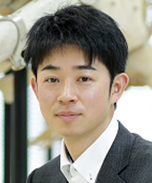
Academic background and working experience
Born in 1983
2007 Graduate Tokyo University of Fisheries
Graduate doctor course of TUMSAT
Researcher at TUMSAT and ICR
2014 Assistant Professor at TUMSAT
2024 Part time lecturer at Ochanomizu University
2024 Associate Professor at TUMSAT
Research topics
- Population estimate of humpback whale
- Density of mercury at liver of Antarctic minke whale
- Skull morphology of common minke whale
- Sexual dimorphism of sperm whale skull
- External morphology of common minke whale
- Sound production mechanism of baleen whale
*Notes for those considering admission from graduate school
For those considering admission to our laboratory from graduate school, please contact the faculties well in advance (for example, half a year before submitting the application). At that time, please submit your research plan of about 1500 words. Any style is acceptable.
Main study areas
Evolutionary phylogeny and biology of Cetaceans
Age composition, sexual maturity, and physical maturity of cetaceans are studied using samples obtained through field research. The external morphology and internal morphology such as skull and hindlimb trace bones are compared by growth stage and region to study the presence and extent of morphological differences by age and region, stock structure, and growth process. There are also opportunities to participate in biological surveys conducted by commercial whalers.
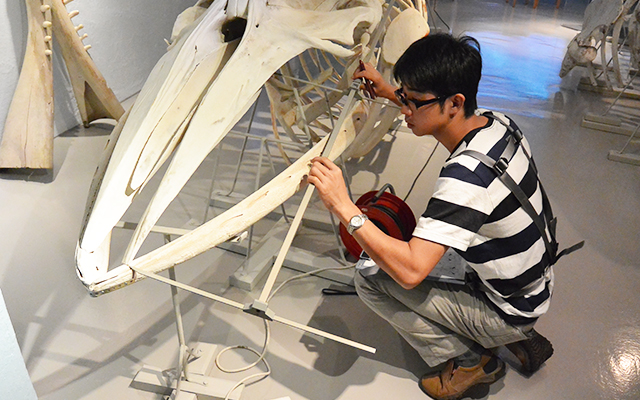
Ecological studies on cetaceans
We are conducting research mainly by borrowing data from the Antarctic Ocean and the North Pacific Ocean obtained from surveys conducted by the Institute of Cetacean Research (ICR) and the National Institute of Fisheries Science (NIFS). We are engaged in a wide range of studies including population size estimation, seasonal frequency of occurrence, image recognition, changes in distribution trends, population genetics, feeding ecology, and marine ecosystem modeling with a focus on cetaceans. There are also opportunities to participate in sighting surveys conducted by external organizations.
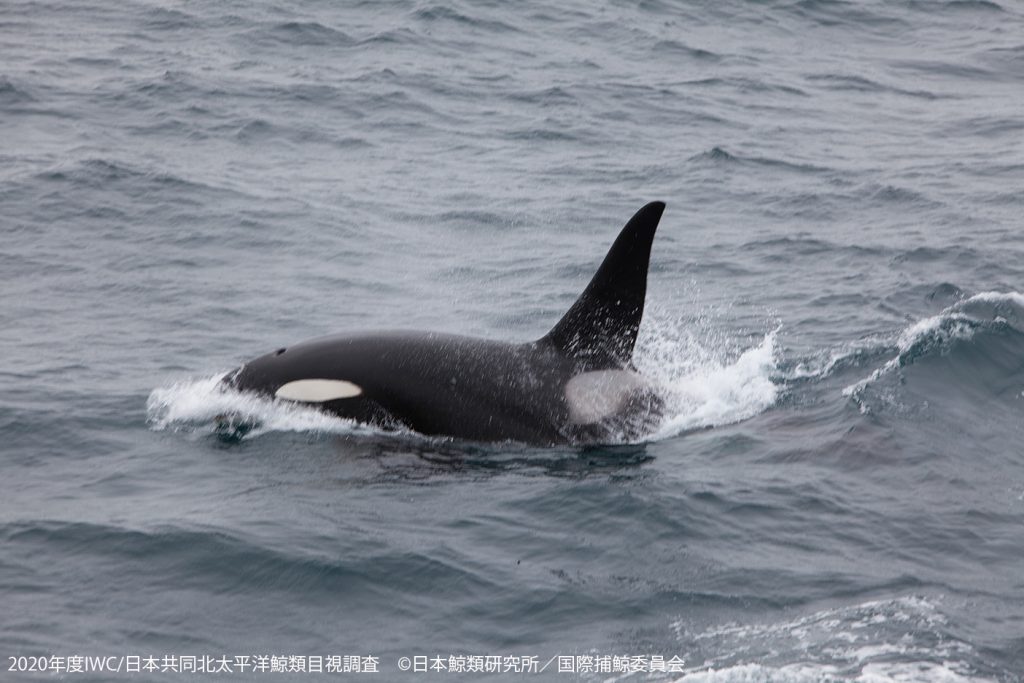
Research on humpback whales in the waters around Japan
In recent years, a rapid increase in abundance has been reported in the waters around Japan, particularly for humpback whales around Hachijo-jima Island. Every year, from November to April, students take the lead in conducting research in cooperation with Hachijo-cho and the Hachijo-jima Tourist Association.
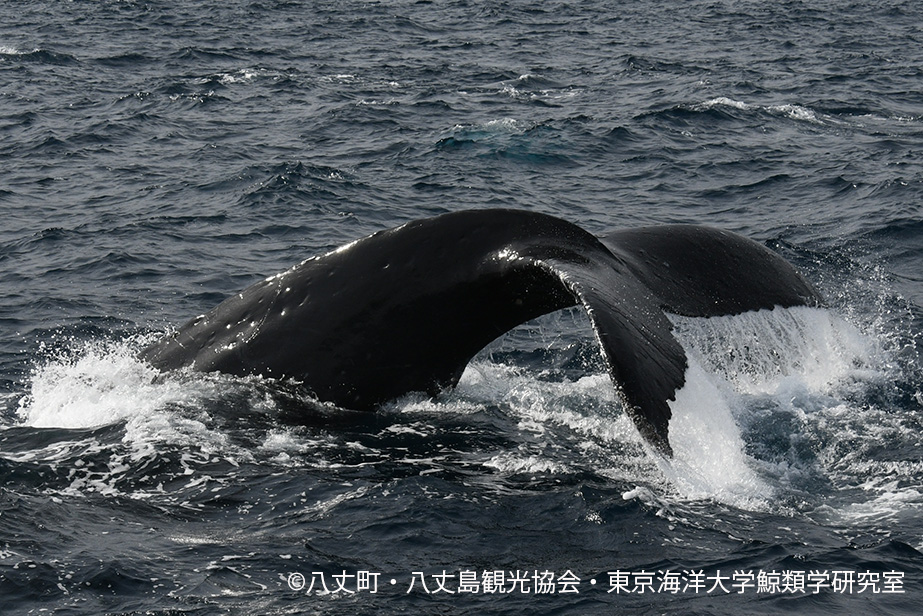
Research for collision avoidance between whales and high-speed vessels
The aim of this project is to develop technology to avoid collisions between cetaceans and high-speed vessels in order to ensure the coexistence of humans and cetaceans. Efforts are being made to evaluate the effectiveness of the new UWS and to improve the accuracy of detection using drive recorders.
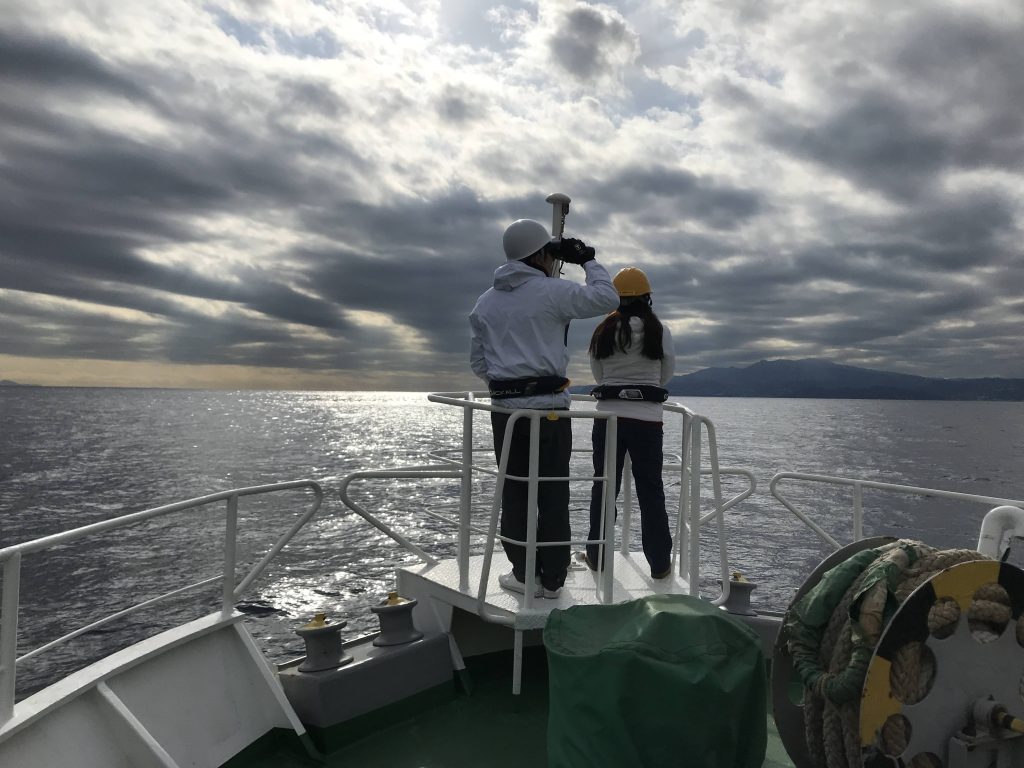
Recent publications and conference presentations
Publications
- Murase, H., Abe, K., Schaafsma, F.L., Katsumata, K., 2025. Overview of the multidisciplinary ecosystem survey in the eastern Indian sector of the Southern Ocean (80–150°E) by the Japanese research vessel Kaiyo-maru in the 2018–19 austral summer (KY1804 survey). Progress in Oceanography 103456. https://doi.org/10.1016/j.pocean.2025.103456
- Igarashi, K., Tanabe, A., Sahara, H., Nozaki, R., Kondo, H., Katsumata, T., Tamura, S., Yamakoshi, T., Mori, M., Miyagi, M., Nakamura, G., Kanda, N., Murase, H., 2025. Application of DNA Methylation–Based Age Estimation to Construct an Age Structure of Humpback Whales in a Newly Emerged Wintering Ground Around Hachijojima Island, Tokyo Metropolis, Japan. Ecology and Evolution, 15, e70854. https://doi.org/10.1002/ece3.70854
- Urabe, I., Matsuno, K., Sugioka, R., Driscoll, R., Driscoll, S., Schaafsma, F.L., Yamaguchi, A., Matsukura, R., Sasaki, H., Murase, H., 2025. Spatio-temporal changes in the macrozooplankton community in the eastern Indian sector of the Southern Ocean during austral summers: A comparison between 1996 and 2018–2019. Progress in Oceanography 231, 103414. https://doi.org/10.1016/j.pocean.2025.103414
- Kokubun, N., Hamabe, K., Yamada, N., Sasaki, H., Nishizawa, B., Watanuki, Y., Murase, H., 2025. Abundance and estimated food consumption of seabirds in the pelagic ecosystem in the eastern Indian sector of the Southern Ocean. Progress in Oceanography 231, 103385. https://doi.org/10.1016/j.pocean.2024.103385
- Matsuno, K., Sugioka, R., Maeda, Y., Driscoll, R., Schaafsma, F.L., Driscoll, S., Yamaguchi, A., Matsukura, R., Sasaki, H., Murase, H., 2024. Spatiotemporal changes in the community and demography of mesozooplankton in the eastern Indian sector of the Southern Ocean during austral summer 2018/2019. Progress in Oceanography, 229, 103360. https://doi.org/10.1016/j.pocean.2024.103360
Conference presentations
- Kinoshita, S., Murase, H., Watari,S. and Yonezaki, S. 2024. Characterization of marine ecosystems in the western North Pacific using ecological indicators. Ecopath 40 Years Conference, InnovOcean campus, Ostend, Belgium, 3-8 June 2024.
- Park, S., Bando, T., Kuno, T., Murase, H., Nakamura, G. 2023. Sexual dimorphism of the laryngeal sacs of Bryde’s whales and relationship with their sexual status. The 13th International Mammalogical Congress. Dena’ina Convention Center, Anchorage, USA. 14-20 July 2023.
- Schaafsma, F., Driscoll, R., Driscoll, S., van Regteren, M., Sugioka , R., Sasaki , H., Matsukura , R., Matsuno, K., van Franeker, J. A. and Murase, H. 2023. The importance of sampling the upper surface waters for understanding the distribution of Antarctic krill (Euphausia superba). Dutch Polar Symposium 2023. Museon, The Hague, Netherlands. 11 May 2023.
- Kokubun, N., Hamabe, K., Yamada, N., Sasaki, H., Nishizawa, B., Watanuki, Y. and Murase, H. 2022. Eat-in or take-away? Quantification of Antarctic resident and non-resident seabirds in the pelagic ecosystem in the eastern Indian sector of the Southern Ocean. The 13th Symposium on Polar Science, Online, 16 November 2022.
- Kim, Y., Nishimura, F., Bando, T., Fujise, Y.,Nakamura, G., Murase, H. and Kato, H. 2022. Prenatal developmental stages of the Antarctic minke whale. 24th Biennial Conference on the Biology of Marine Mammals. Palm Beach County Convention Center, Palm Beach, USA, live-virtual conference, August 1-5, 2022.
Please visit Resaerchmap and Google Scholar sites by clicking the following icons for more details of research outputs
Dr. Hiroto Murase


Dr. Gen Nakamura

